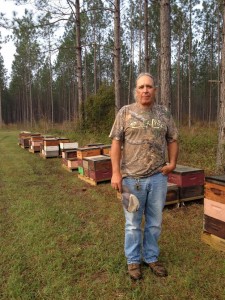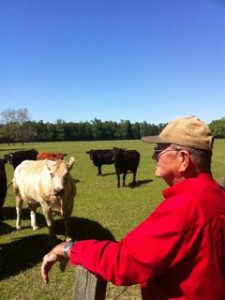the soul of a farmer
field notes from an 8,000+ mile, 4.6 week trip around our country

“Here we are smelling the nectar off of the ti-ti flower. We are fixing to raise queens, and are about two weeks late because of the weather, rain and cold. The bees are getting ready for tupelo which will be around the 15th or 18th of April.” –Steve Cantu, Wewahitchka, in the Florida Panhandle
March 20, 2014
Steve, his wife Leslie and family have moved their honey bees for years from Central Florida north into the Panhandle. The excessive use of chemicals in Central Florida was keeping their queen bees from successfully mating, and was killing the bees that were out for pollination and honey production. The Northwest of Florida, the Panhandle region, is heavily forested, and the bees gather nectar from the flowers here, including the famous tupelo tree that grows in the swamp areas. As it is not an agricultural area like Central Florida, it does not have an extensive use of chemicals.Steve is a long friend. For years we bought orange blossom honey from his family business. The Cantu family moves its bees between the pollination of vegetables and honey gathering of Florida and Michigan. He and Leslie are people of great faith and courage. Finding locations to put your bees and moving them throughout the season is a lot of work.The United States is a country addicted to drugs. The overuse of chemicals in pesticides, herbicides, fungicides, bactericides, miticides, and GMO’s is appalling. Not only is it killing the honey bees, but it is ruining the health of our people. The chemicals and GMO’s offer a short term gain but, as with any drug, the gain is fleeting, and there is always a price to pay. There is no cutting corners for food production without a cost. We are seeing this now in the deaths of bees, the rise of allergies and gluten intolerance many people now have, and the loss of soil.
The endless miles of GMO corn in Indiana and Illinois were staggering. Maybe it was because it was so many thousands of acres upon acres all at once. In Vermont, we are not perfect; we use chemicals and GMO corn, but there are many organic farms, and it is all on a smaller scale.
true friends
 Jim Huggins on his farm
Jim Huggins on his farm
Jim Huggins, Cartwheel Landing, by the Pee Dee River, Marion Country, Mullins, South Carolina
In this day and age, it is rare for a commercial beekeeper to not move colonies of honey bees south for the winter and migrate to a warmer climate. As bees pollinate much of our food, they have to be moved around during the season. For four winters, we moved most of our colonies of honey bees to the Pee Dee River Valley of South Carolina. The bees rested for the winter and were increased in the spring on the land of Jim and Ann Huggins and their family and friends.
Last week I paid my respects to the Huggins family. As always, the visit was centered around family dropping by, meals with pork and cornbread, and a drive around the 1,000 acres of hogs, cattle and timber. For 50 years, the Huggins have been giving shelter and food to northern beekeepers. When you spend much of the winter and spring 900 miles from home, it is a blessing to belong to a community of such generous and kind people and know that you can always walk in for a hot meal, no matter how tired or dirty you are.
By mid-April, the beehives are loaded onto tractor trailers and brought north for their summer pasture. One spring, after the tractor trailer of bees was fully loaded and netted down for the trip north (the bees are loaded when it gets dark and then travel under the cool of the night), the 80,000 lb. load got stuck in the sand of the pine forest and would not budge and move to the road. I called the Huggins family and asked for help. In the middle of the night, they appeared 45 minutes later on their big old tractor, the one with dual rear wheels. They hitched onto the front of the tractor trailer and pulled it, the 200 horsepower diesel engine screaming for an hour, inch by inch to the road. They would not let me cover the cost of even their diesel fuel. The bees were on their way, north to the cooler states before the sun came up. These are true friends, the ones you are forever grateful for.
diesel & hot dogs
Driving north from the Huggins’ last week, I was reminded that I knew every crack in the highway home. Years ago, when I made the trips with the bees or bee equipment, I would often set out for the 900 mile trip either way with $8 cash and a Texaco credit card. That was all that I had, and thankfully it worked. I did not use the toll roads. Honey bees were not allowed on the New Jersey Turnpike. With the credit card, I could buy diesel and hot dogs, cashews and coffee along the way. JR’s on I-95 in North Carolina had a box of cigars marked “free”. They were all broken but they were good for the all night driving with the bees.
Returning home a few days ago from my 8,000+ mile journey across our country, I was very grateful that the trip was much easier. I was not carrying bees; with them aboard, you cannot stop or they will fly away. No stopping at JR’s, but at the homes of a string of friends along the way.
This is a big country, filled with really good people. I saw the growth of local food & spirits being supplied to markets across the land. We need this to take care of our families, our land and farms, and our health.
thank you for your interest in and support of those who work in agriculture and organic honey, grains, and elderberry,
![]()
Todd D. Hardie